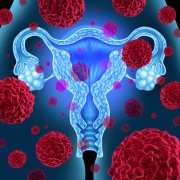Ovarian cancer vs. cervical cancer
It is easy to be confused between ovarian and cervical cancer. After all, they are both gynecological cancers and occur in the female reproductive system. But there are several differences that distinguish the two

Cervical cancer is found in the cervix, which is the narrow, lower part of the uterus where it connects to the upper end of the vagina; ovarian cancer occurs in the ovaries, which are reproductive organs on each side of the uterus in the lower abdomen.
Symptoms
The confusing part can be linked to some of the similar symptoms shared between the two gynecologic cancers. Both ovarian cancer and cervical cancer can cause vaginal bleeding and pelvic pain, but the rest of the symptoms differ. Cervical cancer symptoms also include increased vaginal discharge and pain during sex. Ovarian cancer is a very complex disease with symptoms that are more vague and not always gynecologic: A swollen or bloated abdomen; persistent pressure or pain in the abdomen or pelvis; difficulty eating or feeling full quickly; urinary urgency or frequency; and a change in bowel habits with new onset constipation and/or diarrhea.
Both reproductive cancers cause changes to patients' menstrual cycles. However, patients with cervical cancer may not have symptoms until the cancer becomes more advanced.
Risks of Infection
Most cases of cervical cancer are caused by one of the HPVs that has lasted a while. HPV infection is very common and causes cell to change in the infected cervix. Most of the time, the virus clears itself, with the cells returning to normal. Only in about 10% of the cases do infection persist, causing the cells to grow in an abnormal way and developing into cervical cancer.
Sexual contact or skin-to-skin contact can be the cause of the spread of HPV infection. HPV infection is so common that a majority of people will be infected with HPV at some point in life. But the only way to find out of any abnormality is through a Pap test.
Screening
The bad news is: Cervical cancer is the 10th most common cancer in Singaporean women. Yet, the illness can be effectively treated with early detection. A Pap smear can detect the precancerous stage of cervical cancer when the abnormal cells (dysplasia) are in the outer layer of the cervix and have not spread to the deeper tissues.
Conducted by a nurse or doctor, the simple procedure involves collecting the cells from the cervix by gently brushing the narrow neck of the cervix. The sample is sent to the laboratory for further examination of any changes in the cervix.
All women between the ages of 21 and 65 are encouraged to receive screening every 3 years. A Pap smear obtained during a routine pelvic examination is the typical screening procedure, but when a Pap smear is combined with an HPV test, screening every 5 years is acceptable for women aged 30 and above.
On the other hand, ovarian cancer cannot be detected via a Pap smear or any present screening method for that matter. Yet, as the 5th most common cancer in Singapore, it should be taken lightly. If there is a strong family of history of breast or ovarian cancer, it may be appropriate to go for genetic counseling and testing.
Related Articles
Safe tampon use to prevent toxic shock syndrome
Women can ease their minds about tampon use and its association with a rare condition called toxic shock syndrome with simple preventive measures
Read moreIs swimming during pregnancy good for you?
Women can consider swimming as a safe and beneficial form of exercise during pregnancy
Read moreLatest Articles
Medical Care
Achieving Swift Recovery: Enhanced Recovery (ERAS) Direct Anterior Approach Total Hip Replacement
Consider total hip replacement with Alps Orthopaedic Centre's ERAS Direct Anterior Approach for faster recovery and reduced hospital stays. Learn about Dr. Jerry Chen's expertise in Singapore.
Read moreMedical Care
Enhanced Recovery (ERAS) Total Knee Replacement
Discover how Alps Orthopaedic Centre's Enhanced Recovery After Surgery (ERAS) approach transforms total knee replacement into a day surgery, offering faster recovery, less pain, and reduced hospital bills. Learn about Dr. Jerry Chen's expertise and schedule your appointment in Singapore.
Read moreMedical Care
Clinical Exercise Physiologist (CEP): The Emerging of Exercise is Medicine
How Exercising can be a Medicine
Read more